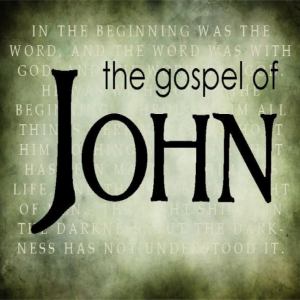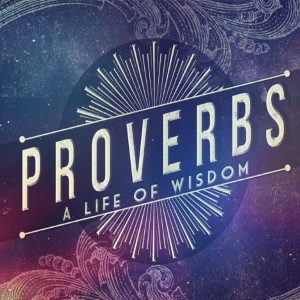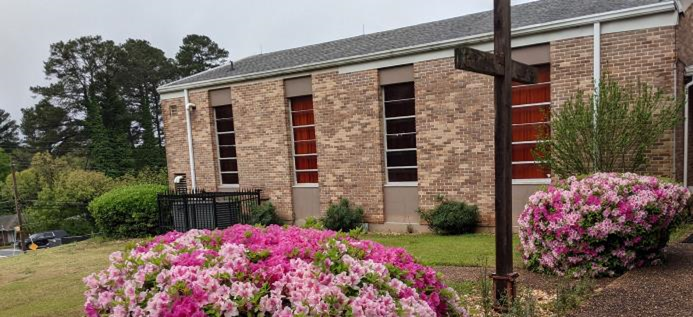Episodes

Tuesday Feb 12, 2019
02-10-19 Kevin Goins - The Desire to Pray, part 2
Tuesday Feb 12, 2019
Tuesday Feb 12, 2019
“The Desire to Pray” (pt 2) Matthew 6:5-13
It takes more to pray than simply knowing how to do it. Something else is required and what is required is desire. Why should we desire to pray? Our text tells us.
I The first reason we should love to pray is that prayer puts us in touch with the most s_____________ relationship we could ever have, a relationship with _____. (6:5-6)
II The second reason we should love to pray is because talking to God in prayer is the most n__________ thing we can ever do (6:7).
A. The first characteristic of pagan prayer is that it depends on using the r________ w_______.
B. The second characteristic of pagan prayer is that it tries to persuade God by r___________ requests over and over.
C. The point Jesus makes about both practices is that they are completely un________________.
III In verse 8 Jesus explains why it is unnecessary to worry about how we e__________ our needs to God – It is because, “The Father a_______ k_______ what you need before you ask him” (6:8).
IV The third reason we should love to pray is because when we pray we are reminded of _____ we really _____ (6:9).
A. What reminds us day after day of who we really are in Jesus? It is praying to God as “O_____ F_______.”
B. We begin our prayer by reminding ourselves who ____ are: We are ___________ of God. And we begin our prayer by reminding ourselves who _____ is: He is not some i___________ power, but our Father.
C. Some find it hard to think of God as their father because they had fathers who abused or abandoned them. But Jesus says we are to pray, not to ____ father, but to our Father who is ___ ___________.
D. But “in heaven” not only means that this father has no _____, but it also means he has no w__________.

Tuesday Feb 05, 2019
02-03-19 Kevin Goins - The Desire to Pray
Tuesday Feb 05, 2019
Tuesday Feb 05, 2019
“The Desire to Pray” Matthew 6:5-13
It takes more to pray than simply knowing how to do it. Something else is required and what is required is desire. Do we want to pray? Why should we love to pray? Our text tells us.
I We may swear we l_______ God, but can we really mean it if we have no d_______ to talk to him.
A. How, can it be that we don’t love talking with God? The enemy has taken our v________ and turned everything u________ d_______.
B. Matthew 6:9-13 is a p________, or b_____________, for the kind of prayer which followers of Jesus need to pray. But not only does this passage teach us h_____ to pray, but in this prayer we learn why we should l______ to pray.
II Who are the super-saints who have a n__________ a________ to love prayer? Jesus says it is the h_____________.
A. Hypocrites could not choose the t______ for prayer, but they could decide w______ they would be when those times came.
B. But notice Jesus’ response: he does not say the hypocrites were hypocritical because they prayed in order to receive a r________, he says they are hypocrites because they pray for the ________ reward.
III Here is the first reason why we should be t________ with prayer: Prayer strengthens the most wonderful relationship we can have, a relationship with _____.
A. The reason we often think of prayer as duty, rather than pleasure, is because we look at prayer in the _______ way: We often think of prayer as one long list of r___________ to dump on God.
B. Prayers of request are legitimate prayers, but they are not the o____ kind of prayer and they are not the most i________ kind of prayer.
IV The four steps for relational prayer are:
A. P___________ yourself to God without p___________.
B. A__________ to how you t________ about God.
C. P_________ yourself of anything blocking your relationship with God.
D. A_________ God as the f_______ concern of your life.

Wednesday Jan 23, 2019
01-20-19 Kevin Goins - Ministry in the Middle
Wednesday Jan 23, 2019
Wednesday Jan 23, 2019
“Ministry in the Middle” Luke 11:5-8
There is a kind of ministry in which every follower of Jesus must stand in the middle, and this ministry in the middle is one of the most important ministries in which any believer ever takes part. In Luke chapter 11 Jesus uses a parable to explain this ministry to us.
I This story is about ________ people:
A. First, there is the man/woman in the ___________, and this could easily be ______ or _____.
B. Who are we in the middle of? On one side we have a friend who is on a journey and he comes to our door hoping for r_______ and b_______ for the night.
C. The third person in the parable is the one who stands on the o_______ side of us, our n________ who has the bread we lack.
II This story is about being a middleman/woman in the p________ sense: one who stands between a friend who n_______ bread and another who h____ bread.
A. But a parable uses a common event in the physical world to help us understand what happens in the s__________ world.
B. An i____________ is someone who stands between a person who has a need only God can meet and God himself.
C. Jesus says when you act as an intercessor for a friend in need, and you come knocking on God’s door for help, that door will be ____.
II We have looked at the three individuals in the parable, but what does the man/woman in the middle teach us about being an intercessor?
First, to be an intercessor we must have a f_______ who is willing to c_____ to us for help.
Second, to be an intercessor we need to know the difference
between needs we can ______ and needs only ______ can meet.
C. Third, to be an intercessor we must be convinced prayer makes a _____________.
D. Fourth, to be an intercessor we must be s_____________.
E. Finally, to be an intercessor we must be willing to p_____ the p_______ of being an intercessor.

Tuesday Jan 08, 2019
01-06-19 Kevin Goins - The Dos and Don'ts of the Lord's Supper
Tuesday Jan 08, 2019
Tuesday Jan 08, 2019
“Do’s and Don’ts of the Lord’s Supper” 1 Corinthians 11:23-32
In 1 Corinthians chapter eleven Paul is dealing with a church who has gotten their celebration of the Lord’s Supper all wrong. His response to them is deeply theological, but it is also very practical. It is his practical instruction that we want to look at today.
I The first Do of the Lord’s Supper is Do t________ o________ what you know about the Lord’s Supper (11:23).
A. The Lord’s Supper began when Jesus gathered with his
disciples to celebrate the Jewish holy day known as _____________.
B. It is easier to remember something when you hold in your hands a t__________, p__________ reminder
II The second Do of the Lord’s Supper is Do c____________ the Lord’s Supper r____________(11:23-24).
III The third Do is a Don’t: Don’t forget h____ m_____ Jesus l________ the church (11:27-29)
A. The Lord’s Supper draws each of us into r_____________ with every other member of the Body of Christ – This is why the Lord’s Supper is also called C______________.
B. What Paul is upset about with the Corinthians is ______ they are celebrating the Lord’s Supper.
C. What Paul is saying is that there is a close and powerful c___________ between the way we t_______ each other in church and whether our celebration of the Lord’s Supper is worthy or unworthy.
IV The fourth Do of the Lord’s Supper is Do e________ y_________.
V The final Do of the Lord’s Supper is Do remember _________.

Wednesday Jan 02, 2019
12-30-18 Bruce Bliss - Balanced Disciple
Wednesday Jan 02, 2019
Wednesday Jan 02, 2019
Up Questions
Do I make enough space for payer?
What situation or what person is weighing on my heart?
Am I noticing God’s strength and power more and more in my life?
Am I living in a state of peace?
Am I afraid or nervous?
Am I obedient to God’s prompting?
In Questions
Do I love the people at FAC (in my community)?
How well do I know their story?
Do I have any FAC relationships outside of Sunday morning?
Am I discipling anyone?
Am I making myself vulnerable to others?
Do I keep my promises?
Out Questions
Do I have a heart for people not living in the story of Jesus?
How often do I share my faith?
Do I leave time for relationships with non-Christians?
Am I proud of the gospel or ashamed?
Am I a servant?
Do I intentionally spend time with the poor?
Am I generous with my finances to those who don’t have enough?

Wednesday Dec 19, 2018

Tuesday Nov 27, 2018
11-25-2018 Kevin Goins - I Love A Mystery
Tuesday Nov 27, 2018
Tuesday Nov 27, 2018
“I Love a Mystery” (conclusion) John 7:53-8:12
Someone has said, “We all love a good mystery.” If that’s true, then we should really enjoy the passage we’re looking at today because it is loaded with mysteries.
I The first mystery is the mystery of the misplaced story.
II The second mystery is the mystery of iniquity.
III The third mystery is the mystery of the m___________ a___________ (8:3-6a).
A. The fact that only h______ of the wrongdoers were brought to justice tells us that something s____________ is taking place.
B. Putting Jesus into what they thought was a “No-_____” situation was their ______ reason for accusing this woman.
IV The fourth mystery is the mystery of the w______ in the s_________ (8:6b-9a).
A. It’s not w______ Jesus wrote in the dust that is important – For two reasons:
1. If what he wrote was important, we would have been t_______ what it was.
2. When John says (8:9) that the accusers went away, he says it was because of what they h_______ from Jesus, not because of what they s____ written in the dirt.
B. In response to their question, Jesus i________ the Pharisees, showing them that he doesn’t take their show of righteousness s____________.
V The fifth mystery is the mystery of the Holy Spirit’s power to c___________ us with our sin (8:9).
A. When these men first dragged in the girl, they felt no g_______ at all.
B. Jesus said sentence against the woman must be carried out only by those who are not guilty of the s_______ s_____.
VI The sixth mystery is the mystery of the g________ of the Lord Jesus Christ (8:9-11).
A. The one who had every right to c_________ her, chose not to,
because his mission was not to condemn, but to s_______.
B. When Jesus said, “I do not condemn you,” he knew what those words would cost him - they would cost him the ________.

Tuesday Nov 13, 2018
11-11-18 Kevin Goins - A Mysterious Story
Tuesday Nov 13, 2018
Tuesday Nov 13, 2018
“A Mysterious Story”
John 7:53-8:12
Someone has said, “We all love a good mystery.” If that’s true, then we should really enjoy the passage we’re looking at today because it is loaded with mysteries. This morning we are going to focus on two of these mysteries:
I The first mystery is the mystery of the m____________ s________.
A. Most New Testament scholars are convinced that this incident d____ n____ b_______ to John’s Gospel. Why?
1. First, there is the t___________ evidence.
2. Second, when this account did begin to show up in copies of John’s Gospel, some scribes found a way to let readers know there was a p________.
3. Third, in later Greek texts where it does appear, it is found in d___________ places.
4. Fourth, it doesn’t f______ well after John 7:52.
5. Fifth, the l__________ and s________ of these verses are not like John’s Gospel.
II Does it weaken our faith to know that this story, which is so loved by so many, was not originally a part of the Gospel of John? Not if we know something about h_____ we g_____ our Bible.
A. For 1500 years before the invention of the printing press all copies of the Bible were h______________.
B. What is so significant about the Bible is just how many c________ we have. How many manuscripts do we have of the New Testament? Total: _______.
C. Doesn’t the fact that there are so many copies mean that there are likely to be ________ mistakes?
1. First, because there are so many copies, mistakes are s_____-c_____________.
2. Second, these differences in texts are m_______, not m__________.
III The evidence against this story originally being a part of John is s________, but that does not mean this incident _______ happened.
IV The second mystery is the mystery of i_____________.
A. First, there is the iniquity of i____________ carried out by the Pharisees.
B. Second, there is the iniquity of i________________ carried out by the woman.

Sunday Nov 04, 2018
11-04-2018 Kevin Goins - A New Year for FAC
Sunday Nov 04, 2018
Sunday Nov 04, 2018
“A New Year for FAC” James 4:13-17
Today is our Annual Meeting, but rather than think about where we have been and where we want to go, which I have covered in the Annual Report, I want to direct our attention to something far more important: our commitment to seek the will of God in all we do. It is foolish to make plans without seeking and doing God’s will. Why?
I First, planning for the future without seeking God’s will is u__________ (4:13-14a).
II Second, planning for the future without seeking God’s will is a______________ (4:14b-16).
A. James says our life is like a m_______.
B. Making plans for FAC without seeking God’s will is like making an e______ b_______.
III Third, Planning for the future without seeking God’s will is s_________ (4:17).
A. God defines sin, not only as doing what we know to be w________, but also as not doing what we know to be r________.
B. When we live without any concern for God’s will, we are denying his sovereignty (his right to r_______ over us).
IV What is the answer to all this? What is the correct way to plan for the future? We must say, verse 15, “If it is the Lord’s will, we will l_______ and d_____ this or that.”
V This brings up a separate issue: ____ do I determine the will of God in a p____________ instance?
A. First, to know God’s will in a particular situation we must s____________ ourselves to the will of God.
B. Second, if we want to know God’s will, we must _______ _______.
C. Third, we must s__________ God’s _______.
D. Fourth, we need to learn to read the p________________.
E. Fifth, we need to t_____ s______ in the direction in which God is leading us to go.

Tuesday Oct 30, 2018
10-28-18 Kevin Goins - 6 Steps to Peace, conclusion
Tuesday Oct 30, 2018
Tuesday Oct 30, 2018
“Six Steps to Peace” (Conclusion) Proverbs 3:11-12
In Proverbs 3:1-12 Solomon tells us about the six dimensions of life for which God has a special and unique kind of peace for us. Verses 1-2 focused our attention on Spiritual Shalom, or peace with God. Verses 3-4 were about Community Shalom, or peace with people. Verses 5-6 directed our attention to decision-making shalom. Verses 7-8 were focused on physical shalom, or peace in our body, and verses 9-10 were about financial shalom. Today we conclude with verses 11-12 and corrective shalom.
I What makes verses 11-12 so interesting is that we can easily see the l_____ s___________ out of which these words came to be written.
A. According to Prov 13:24, the parent who allows a child to do as she or he pleases actually h________ his child.
B. Refusing to follow God will not s______ you from God’s discipline.
II Living our life knowing that there is an almighty and absolutely holy God w_________ us, and knowing that our willful disobedience of his commands could bring his discipline, can make us very u____________. But we can have ________ if we’re willing to following his instructions:
A. Solomon says, verse 11, “My son, do not d__________ the Lord’s d____________.”
1. The question Solomon asks is this: when we mess up and when God brings discipline (correction) into our life, how will we ________?
2. When we despise God for his discipline, we are r________ what he is working to do in our life.
3. When we despise God’s discipline we not only reject God, we miss out on what his discipline could a___________ in our life.
B. Then Solomon says, “and do not r________ his r_________.”
Rebuke means to use words to convince someone they have done wrong, not to s_______ them, but to call them to r__________.
2. When we resent rebuke, we are actually getting angry at _____. We resent the fact that he allowed someone to
confront us with his _________.
III As with the other five kinds of shalom, to obey the c_________ of verse eleven, entitles us to the r_________ of verse twelve.
A. The first reward is __________ ___ ______ __________.
B. The second reward is knowing that God does his work of discipline so that he can take d___________ in us.

